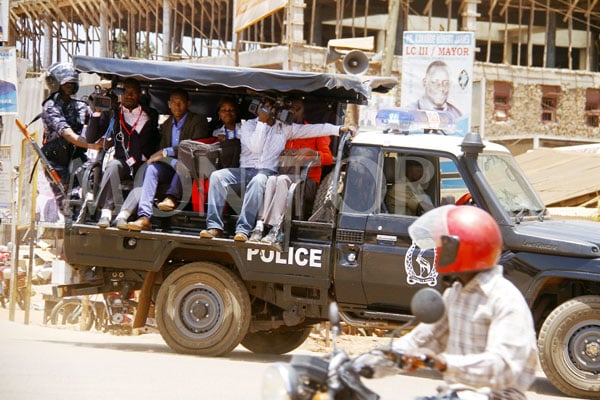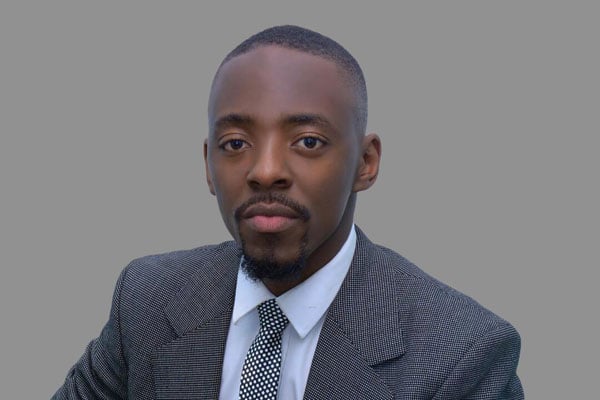Prime
Unlocking press freedom in Uganda: What must be done

Journalists on a police pick-up truck after they were arrested near the home of Opposition activist Dr Kizza Besigye in Kasangati, Wakiso District, on April 27, 2016. PHOTO | ABUBAKER LUBOWA
What you need to know:
- Although enshrined under Articles 29 and 41 of the Ugandan Constitution, repeated violation of press freedoms, profoundly by security forces, has raised questions over what appears to be a crisis of legitimacy.
In 2018, Reporters Without Borders (RSF) global press freedom index placed Uganda 125th out of 180 nations—a grim rank the country held for three consecutive years.
By 2022, the East African nation of more than 44 million people had nosedived seven places as practitioners in Uganda’s fourth pillar of democracy continued to be threatened with a record overt and covert forms of repression from State actors.
Now, the nation’s status of independent journalism falls far away from RSF’s description of free press. RSF defines media freedom as “the effective possibility for journalists, as individuals and as groups, to select, produce and disseminate news and information in the public interest, independently from political, economic, legal and social interference, and without threats to their physical and mental safety.”
Return to democratic path
With Uganda’s media freedom shrinking, her journalism has found a grim position contrary to the suggestion of Marxist philosopher Antonio Gramsci, who postulates that “history teaches, but has no pupils.”
In this case, a pupil of Uganda’s media historiography, fourth-year journalism and communication student at Makerere University, Ms Belinda Birungi, is “extremely scared to go missing once admitted into media practice.”
“I am fearful of police and army brutality. Besides, they’re many grey areas in our Constitution that can be used against you,” says the 22-year-old Ugandan.
Endless crackdowns on media houses have subdued the likes of Ms Birungi to self-censorship.
“Security forces have snatched our courage to present the wrongs of society… I mean the courage to write objectively,” said Ms Birungi, who was interning at the country’s leading independent newspaper, Daily Monitor, at the time of this publication.
Between coming to terms with a brutal state capture of the media and surviving, Ms Birungi “prefers other things to becoming part of over 40 journalists killed globally every year.”
In reply to Ms Birungi’s concerns, the head of postgraduate journalism studies at Uganda Christian University (UCU), Ms Annette Kezaabu, underscores that “harassment and criminal sanctions are dangerous to journalism.”
She adds that one way of dealing with this is to ensure “cases of journalists should be handled as civil wrongs like in most liberal societies.”
Although enshrined under Articles 29 and 41 of the Ugandan Constitution, repeated violation of press freedoms, profoundly by security forces, has raised questions over what appears to be a crisis of legitimacy.
But Kezaabu, who also leads the Uganda Pornography Control Committee at the Ethics and Integrity Ministry, says “the laws in place are sufficient and don’t require a constitutional rewrite.”
“We should use the laws to tighten where security has made inroads, but there are things that we don’t talk about that are maybe an error of compromised journalists,” she says, adding, “Journalists must abide by accepted ethos for their freedom’s sake.”
Kezaabu, however, admits that interpretation or application of the law against journalists may be one-sided to suit the wishes of its enforcers or the jury.
“There’s need to return the country to a democratic path to safeguard human freedom, including the one of expression,” she urges.
Further, Kezaabu acknowledges that use of anti-terrorism laws and a litany of other decrees against free speech are a clear loop of claw-back clauses in the Constitution.
“It is incumbent upon media houses and journalists to know when not to overstep their mandate to avoid clashing with authorities by, for instance, promoting nudity,” she advises.
Arriving at a similar argument, Aga Khan University School of Media and Communications graduate lecturer Alex Taremwa “believes without social responsibility to audiences, the media lose the values that make their duty to society important.”
Mr Taremwa argues that breaching the universally known media mandate and standards may instantly birth the horrors that have defined the industry in the eyes of individuals like Ms Birungi.
New business models
One of the other challenges press freedom in Uganda faces is that there are more than 200 radio stations and more than 30 televisions in Uganda. The number is impressive. At least superficially. Nearly 70 percent of these stations are, however, owned by either deep state or legislators, according to an African Centre for Media Excellence 2022 survey.
“They control the broadcast narrative and that breaks journalism’s will to mirror society,” observes 2019 BBC Komla Dumar award-winning investigative journalist Solomon Sserwanja.
To evade the proprietor censorship oriented by political and commercial interests, Mr Sserwanja moots alternative business models to run media operations.
“…for instance, media houses can go after full subscription and run away from advertisers whose commercial advertising interests may force media houses to filter serious stories,” he told this publication on September 6.
Fair pay for journalists
The ability for journalists to report freely is also hampered, for many reasons, by the poor pay journalists are given. In Uganda, pay cheques of journalists have steadied below $200 (about Shs760,000) per month amid lack of newsroom investment by media moguls.
At least each senior editor contacted from five different (both) state and private media houses reasons that “equipping reporters is an essentiality for free press in a digital evolution.”
For 25-year-old Soft Power News journalist and digital assistant Muhamadi Byemboijana, “press freedom starts internally with employers ensuring fair pay for journalists.”
He adds: “Some press corps are battered because the tormentors have no respect for their low paying profession.”
In addition to that, because of the poor pay, many journalists will take bribes to manage the cost of living. A Ugandan journalist, who preferred anonymity, on September 7 confessed to accepting a “small bribe to kill a story.”
“I killed a match fixing story involving the national cricket team because I felt unprotected, including by the media house I work for. Eventually, I accepted pay from the sports fixers,” the television sports scribe said in an interview.
This is why fair pay, although it might be a difficult subject to talk about, must be looked into to allow journalists do their work well. Mr Taremwa, in agreement of this, states that “like any other [human] right, good pay definitely increases the quality of freedom-enjoyment and eliminates the threat of bribery or blackmail, which endangers one’s journalistic autonomy.”
Civic engagement
Another challenge to press freedom is the fact that the audiences for whom they write may not be critically aware of the role of the media.
Over the last two decades, several media houses have emerged in almost all Ugandan regions—usually with screaming headlines critical of the State, signalling the possibility that media freedom has made some gains to be preserved.
However, by 2013, an absolute militaristic approach under the Museveni presidency had outpaced his classical conservative National Resistance Army (NRA) post-guerilla war promise of a “free press” in 1986.
“The public cannot say it enjoys freedom if information is being hidden from them. To move our press freedom higher than like 65 percent, awareness should be created in the public domain regarding the fundamental importance of journalism,” Kezaabu says.
To protect what he describes as his endangered freedom on duty, Mbale City-based Step FM talk show host Eric Mwasame, 30, wants “journalism recognised as a fundamental pillar of development.”
“Society, especially politicians, take us as people who fight governments or mere antagonists, which is untrue. That should change,” Mr Mwasame says.
Similarly, Kampala City resident Peninah Rukundo singles out “civic engagement as a crucial enabler of free speech.”
While the challenges to press freedom remain, some of these solutions can begin to pave the way for a media that is able to do its job robustly, which in turn provides the nation a good service.
Forming associations
For many professions, associations help push their agenda and enable them to have a listening ear from the powers that be. In the case of the media, however, a tiny sliver of Uganda’s hundreds of journalists subscribe to press associations that largely exist only in name in a complex political environment. This has discouraged many from joining them.
“I want to know what these associations are doing for journalism by their actions and then I’d join them,” freelance journalist Daniel Emukule, 39, reacts when asked why he’s not conformist to any press association.
Worryingly also, the near absence of Fourth Estate unions—as tens of journalists are continuously persecuted—has compelled at least eight out of 10 reporters interviewed by this newspaper on September 7 to describe existing press associations as “state-linked and inoperative.”
Forming strong and respected media unions and, or associations would, therefore, provide much needed support.
“In areas where relative press freedom exists, working associations are vocal against injustices targeting journalists and that’s why vibrant ones are essential for press freedom,” the head of postgraduate journalism studies at Uganda Christian University (UCU), Ms Annette Kezaabu, emphasises.
Mr Sserwanja, 35, who left his job at a top media house in Uganda to become chief executive officer at the African Institute for Investigative Journalism (AIIJ), holds that the country needs more such establishments that protect threatened media practitioners.
“All of us (stakeholders) have a role to play to better journalism in this country. The future of journalism relies on collaborations by entities that lead conversations against media repression,” he says.
This story has been run with support from the Media Freedom Committee (MFC) Uganda in connection with WAN-IFRA.





